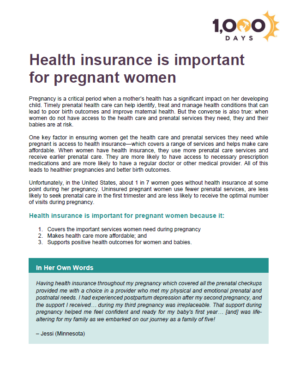Health Insurance for Pregnant Women: What You Should Know-www.waukeshahealthinsurance.com-www.waukeshahealthinsurance.com
Unexpected medical expenses can quickly escalate, making comprehensive health insurance crucial for expectant mothers. Navigating the complexities of health insurance during pregnancy can feel overwhelming, but understanding your options and rights is the first step towards ensuring a financially secure and healthy pregnancy. This article will guide you through the essential aspects of health insurance for pregnant women, focusing on coverage, costs, and finding the right plan.

Understanding Your Coverage:
The Affordable Care Act (ACA) significantly improved access to healthcare for pregnant women. Most plans offered through the ACA marketplaces, including those in Wisconsin, are required to cover essential health benefits, which include maternity care. This means that your insurance should cover prenatal care, labor and delivery, and postpartum care. However, the specifics of your coverage will depend on your individual plan. It’s crucial to carefully review your policy’s summary of benefits and coverage (SBC) to understand what’s included and what’s excluded. For a detailed understanding of Wisconsin health insurance options, including maternity coverage, visit our website at www.waukeshahealthinsurance.com.
Key Aspects of Maternity Coverage:
- Prenatal Care: This includes regular checkups with your obstetrician or midwife, ultrasounds, blood tests, and other diagnostic procedures. Most plans cover these services comprehensively.
- Labor and Delivery: This encompasses the costs associated with your delivery, whether it’s a vaginal birth or a Cesarean section. Hospital stays, anesthesia, and other related medical services are typically covered.
- Postpartum Care: This includes checkups for both you and your baby after delivery. Postpartum care is vital for monitoring your recovery and your baby’s health. Your insurance should cover these essential visits.
- Neonatal Care: If your baby requires specialized care after birth due to complications, your insurance should cover the necessary medical services. However, the extent of coverage might depend on the specifics of your plan and the nature of the complications.
- Prescription Medications: Prenatal vitamins, pain relievers, and other medications prescribed during pregnancy and postpartum are usually covered. Always check your formulary to ensure your prescribed medications are covered.

Costs and Out-of-Pocket Expenses:
While maternity care is generally covered, you’ll still likely face out-of-pocket expenses. These can include:
- Premiums: The monthly payments you make for your health insurance plan.
- Deductibles: The amount you must pay out-of-pocket before your insurance begins to cover your medical expenses.
- Copays: Fixed fees you pay at the time of service, such as doctor’s visits.
- Coinsurance: The percentage of the cost you pay after meeting your deductible.
- Out-of-Network Costs: If you see a provider who is not in your insurance network, you’ll likely pay significantly more.

The amount of your out-of-pocket expenses will vary greatly depending on your chosen plan, your provider, and the complexity of your pregnancy and delivery. To compare plans and understand your potential costs, you can use our online tools at www.waukeshahealthinsurance.com. We offer resources to help you find a plan that fits your budget and needs.

Choosing the Right Health Insurance Plan:
Selecting the right health insurance plan during pregnancy requires careful consideration. Here are some key factors to keep in mind:
- Network of Providers: Choose a plan with a network of providers that includes obstetricians and hospitals you prefer. This can help minimize out-of-network costs.
- Maternity Coverage Details: Thoroughly review the specifics of maternity coverage in each plan’s SBC. Pay attention to details like coverage for prenatal tests, delivery options, and postpartum care.
- Premium Costs: Balance the premium costs with your expected out-of-pocket expenses. A lower premium might mean higher deductibles and copays.
- Deductible and Out-of-Pocket Maximum: Consider the plan’s deductible and out-of-pocket maximum. A lower out-of-pocket maximum can provide more financial protection against unexpected costs.
- Prescription Drug Coverage: Ensure the plan covers the prenatal vitamins and any other medications you might need.
Special Considerations:
- Pre-existing Conditions: The ACA prohibits insurance companies from denying coverage or charging higher premiums based on pre-existing conditions, including pregnancy-related conditions.
- Medicaid and CHIP: If you have a low income, you may qualify for Medicaid or the Children’s Health Insurance Program (CHIP), which provide comprehensive coverage for pregnant women and their children. For information on Medicaid and CHIP eligibility in Wisconsin, consult our resources at www.waukeshahealthinsurance.com.
- Employer-Sponsored Insurance: If you have employer-sponsored insurance, understand your plan’s maternity coverage and whether it meets your needs.
Preparing for Pregnancy-Related Costs:
Even with comprehensive health insurance, pregnancy can be expensive. Here are some tips for managing costs:
- Create a Budget: Track your expenses and create a budget that includes anticipated medical costs.
- Save Money: Start saving money as early as possible to cover potential out-of-pocket expenses.
- Explore Financial Assistance Programs: Inquire about financial assistance programs offered by your hospital or healthcare providers.
- Negotiate Medical Bills: Don’t hesitate to negotiate medical bills if you face financial difficulties.
Conclusion:
Having adequate health insurance during pregnancy is essential for both your physical and financial well-being. By understanding your coverage, carefully selecting a plan, and planning for potential costs, you can navigate this exciting time with greater peace of mind. Remember to utilize the resources available on our website, www.waukeshahealthinsurance.com, to find the best health insurance plan for your individual needs. We are dedicated to helping you secure comprehensive coverage that supports you and your baby throughout your pregnancy journey. Don’t hesitate to contact us with any questions you may have. We’re here to help you make informed decisions and ensure a healthy and financially secure pregnancy.
